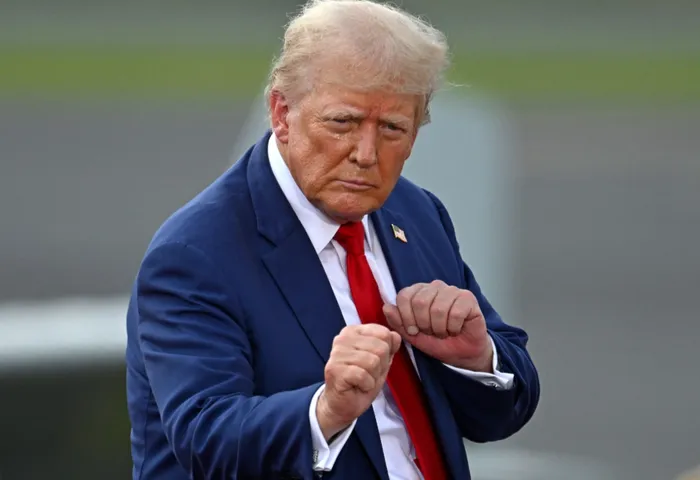
Donald Trump has threatened to boycott the G20; an absent USA could hurt the global aim of the G20, says the writer.
Image: Peter Zay / AFP
THE G20 Summit, expected to be held on November 22 and 23, in Johannesburg, is set to take place during a period of significant global change. South Africa has accepted the G20 presidency from December 1, 2024, to November 2025. The world is grappling with the lingering aftershocks of a pandemic, escalating climate disasters, a war in Europe and the Middle East.
The ripple effect has disrupted global energy and food supplies, leading to a troubling drift towards geopolitical blocs. Amidst this backdrop, the summit, under the theme “Building a Resilient and Stable Global South-Backed Economy,” is a critical test for whether the world’s premier forum for international economic cooperation can still function and lead effectively.
It began as a forum for finance ministers and central bank governors in 1999 and quickly evolved into its current format as a forum for leaders. The G20 was created during the crisis. In the wake of the 2008-2009 global financial meltdown, it proved its worth by coordinating a unified response and averting a second great depression.
Many believe that its strength has been underpinned by its inclusivity, considering the forum brings together wealthy Western powers with dynamic emerging economies, such as China, India, Brazil, and the host, South Africa. However, the consensus that enabled that 2008 response no longer seems to have weakened. The Ukraine conflict has created a deep divide within the group, notably the G7 nations grouped against Russia, a G20 member.
Last year’s summit in Bali saw this division unfold publicly, and the challenge of producing a joint communiqué that satisfies all parties has almost become a mission impossible. The premise of a G20 that shares economic interests and is able to transcend political differences, is now under threat. Under South Africa’s tenure, the G20 will focus on issues of universal concern, particularly those vital to the global south.
The official agenda, as outlined on the G20 portal, prioritises:
1. Sustainable finance and infrastructure: there is a pressing need to bridge the multi-trillion-dollar financing gap for climate-resilient infrastructure and the UN Sustainable Development Goals (SDGs). Expect intense discussion on reforming Multilateral Development Banks (MDBs) to leverage private capital more effectively.
2. Climate change and just energy transitions: the tension between the global north's push for rapid decarbonisation and the global south's need for energy security and economic development will be central. The concept of a "just transition" is key, requiring significant financial and technological support from developed nations.
3. Digital transformation and food security: leveraging technology for economic inclusion and addressing the persistent threat of food insecurity, exacerbated by the war in Ukraine and climate change, are critical action points.
These are the bedrock of long-term global economic stability. A failure to make substantive progress here would signal a dangerous inability to address the century’s defining challenges.
Expected Impact on the World and G20 Nations by the summit can not be measured in dramatic breakthroughs for the G20; it is more about holding ground to develop the platform for future cooperation. A successful outcome would be a strong consensus by leaders to concentrate on vital economic cooperation. Solid progress on MDB reform and establishing clearer mechanisms for climate finance would be a win for global stability.
On the other hand, a failure that would be manifested by a cancelled summit, low attendance by leaders of powerful nations, a weak and toothless collective conclusion, or a complete diplomatic breakdown, would embolden narratives of a bifurcating world order and deepen economic fragmentation.
Donald Trump has threatened to boycott the G20; an absent USA could hurt the global aim of the G20. The component of developed economies within the G20, in particular the G7, are seeking partners to uphold a rules-based order and manage the economic influence.
Meanwhile, China, India, and other developing economies will seek to grow or solidify economic relationships, looking for tangible financial commitments and a greater voice in global governance. The summit will reveal whether these interests can be aligned or if transactional, where deals between two nations will yield to competing issues that affect the world. All members have a vested interest in preventing a full-scale global recession, making discussions on coordinated macroeconomic policy crucial rather than self-interest.
South Africa hosting the G20 presents both immense opportunities and significant risks. On the positive side, this is a powerful assertion of our diplomatic stature and a nod to our role as a leading voice for the African continent. This is a unique platform to shape the global agenda. As South Africa, we will be able to spotlight African priorities, such as debt distress and energy transition financing, and attract foreign investment. If we are able to deliver a well-managed summit, which I am confident that we will, it will bolster the nation's international brand and provide a welcome economic boost to our tourism and services sectors.
However, on the flipside, the risks are equally real. South Africa’s much-criticised "non-aligned" stance on the Ukraine war and our close ties with Russia will place us under intense international spotlight while balancing the relationships within the BRICS bloc. A diplomatic misstep could isolate the country or tarnish its reputation as a neutral and competent mediator.
Domestically, the government will be scrutinised for spending lavishly on an international event while grappling with severe internal challenges, including load shedding, high unemployment, and economic stagnation. The G20 Summit comes at a crossroads; the path of least resistance leads toward a more fragmented and volatile world economy. The harder path, the one of dialogue, compromise, and collective action, is the only one that leads to resilience and stability.
No single nation, no matter how powerful, can solve climate change, stabilise financial markets, or ensure food security alone. The cost of non-cooperation is high. The success of G20 will not be judged by an elegant banquet, but by the concrete commitments it yields and the signal it sends: that even in an age of fracture, the world's major economies still recognise that their shared prosperity is inextricably linked.

Advocate Lavan Gopaul
Image: File
Advocate Lavan Gopaul is the director of Merchant Afrika.
** The views expressed do not necessarily reflect the views of IOL or Independent Media.
Related Topics: